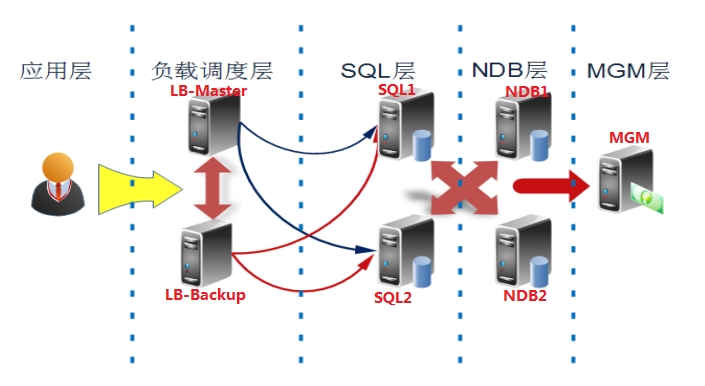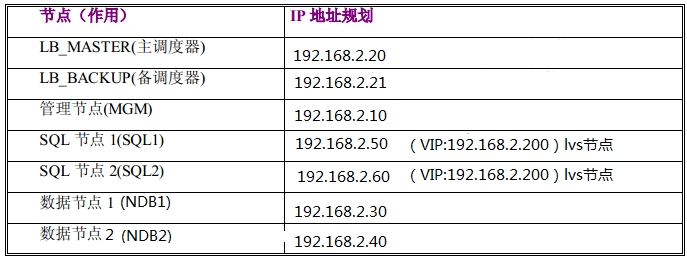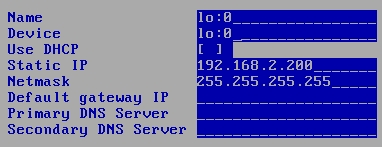一、前言
MySQL Cluster 是MySQL适合于分布式计算环境的高实用、高冗余版本。它采用了NDB Cluster存储引擎,允许在1个Cluster中运行多个MySQL服务器。在MyQL5.0 及以上的二进制版本中、以及与***的Linux版本兼容的RPM中提供了该存储引擎。MySQL Cluster 是一种技术,该技术允许在无共享的系统中部署“内存中”数据库的 Cluster。通过无共享体系结构,系统能够使用廉价的硬件,而且对软硬件无特殊要求。此外,由于每个组件有自己的内存和磁盘,不存在单点故障。MySQL Cluster由一组计算机构成,每台计算机上均运行着多种进程,包括MySQL服务器,NDB Cluster的数据节点,管理服务器,以及(可能)专门的数据访问程序。
二、MySQL Cluster基本概念
NDB是一种“内存中”的存储引擎,它具有可用性高和数据一致性好的特点。MySQL Cluster能够使用多种故障切换和负载平衡选项配置NDB存储引擎,但在Cluster 级别上的存储引擎上做这个最简单。MySQL Cluster的NDB存储引擎包含完整的数据集,仅取决于Cluster本身内的其他数据。
目前,MySQL Cluster的Cluster部分可独立于MySQL服务器进行配置。在MySQL Cluster中,Cluster
的每个部分被视为1个节点。
管理(MGM)节点:这类节点的作用是管理MySQL Cluster内的其他节点,如提供配置数据、启动并停止节点、运行备份等。由于这类节点负责管理其他节点的配置,应在启动其他节点之前首先启动这类节点。MGM节点是用命令“ndb_mgmd”启动的。
数据(NDB)节点:这类节点用于保存Cluster的数据。数据节点的数目与副本的数目相关,是片段的倍数。例如,对于两个副本,每个副本有两个片段,那么就有4个数据节点。不过没有必要设置多个副本。数据节点是用命令“ndbd”启动的。
客户(SQL)节点:这是用来访问Cluster数据的节点。对于MySQL Cluster,客户端节点是使用NDB Cluster 存储引擎的传统MySQL服务器。通常,SQL节点是使用命令“mysqld -ndbcluster”启动的,或将“ndbcluster”添加到“my.cnf”后使用“mysqld”启动。
注释:在很多情况下,术语“节点”用于指计算机,但在讨论MySQL Cluster时,它表示的是进程。在单台计算机上可以有任意数目的节点,为此,我们采用术语“Cluster主机”。
管理服务器(MGM节点)负责管理Cluster配置文件和Cluster日志。Cluster中的每个节点从管理服务器检索配置数据,并请求确定管理服务器所在位置的方式。当数据节点内出现新的事件时,节点将关于这类事件的信息传输到管理服务器,然后将这类信息写入Cluster日志。
三、环境
系统:CentOS6.4 32位 9台
软件包(可以去mysql官网下载http://dev.mysql.com/downloads/cluster/):
MGM:
MySQL-Cluster-gpl-management-7.1.31-1.el6.i686.rpm
MySQL-Cluster-gpl-tools-7.1.31-1.el6.i686.rpm
SQL节点:
MySQL-Cluster-gpl-client-7.1.31-1.el6.i686.rpm
MySQL-Cluster-gpl-server-7.1.31-1.el6.i686.rpm
NDB节点:
MySQL-Cluster-gpl-storage-7.1.31-1.el6.i686.rpm
拓扑图:

IP规划:

四、配置(请先卸载掉与mysql有关的所有RPM包)
1.LB-Master及LB-Backup配置
(1)LB-Master及LB-Backup安装keepalived和ipvsadm
- # yum groupinstall "Additional Development" //安装开发工具
- # yum groupinstall "Development tools"
- # tar -zxvf keepalived-1.2.1.tar.gz -C /usr/local/src/
- # cd /usr/local/src/keepalived-1.2.1
- # ./cnfigure
- Keepalived configuration
- ------------------------
- Keepalived version : 1.2.1
- Compiler : gcc
- Compiler flags : -g -O2
- Extra Lib : -lpopt -lssl -lcrypto
- Use IPVS Framework : No //配置出现错误
- IPVS sync daemon support : No
- Use VRRP Framework : Yes
- Use Debug flags : No
- 解决方法:
- # yum install kernel-devel ipvsadm
- # ln -s /usr/src/kernels/2.6.32-358.el6.i686/ /usr/src/linux
- # ./cnfigure //再次配置环境
- # make //编译
- # make install //安装
- # cd /usr/local/etc //keepalived默认安装路径
- # ll
- drwxr-xr-x. 3 root root 4096 May 24 00:37 keepalived
- drwxr-xr-x. 3 root root 4096 May 24 00:29 rc.d
- drwxr-xr-x. 2 root root 4096 May 24 00:29 sysconfig
- 配置以系统方式service启动
- # cp /usr/local/etc/rc.d/init.d/keepalived /etc/rc.d/init.d/
- # cp /usr/local/etc/sysconfig/keepalived /etc/sysconfig/
- # mkdir /etc/keepalived
- # cp /usr/local/etc/keepalived/keepalived.conf /etc/keepalived/
- # cp /usr/local/sbin/keepalived /usr/sbin/
(2)LB-Master及LB-Backup的keepalived主配置文档
- # cat /etc/keepalived/keepalived.conf
- #guration File for keepalived
- #global define
- global_defs {
- router_id HaMySQL_1
- }
- vrrp_sync_group VGM {
- group {
- VI_MYSQL
- }
- }
- vrrp_instance VI_MYSQL {
- state MASTER //LB-Backup设置为BACKUP
- interface eth0
- lvs_sync_daemon_inteface eth0
- virtual_router_id 55
- priority 100 //LB-Backup设置为90
- advert_int 5
- authentication {
- auth_type PASS
- auth_pass 123456
- }
- virtual_ipaddress {
- 192.168.2.200/24 dev eth0
- }
- }
- ########## LVS MySQL Start ###########
- virtual_server 192.168.2.200 3306 {
- delay_loop 6
- lb_algo rr
- lb_kind DR
- persistence_timeout 6
- protocol TCP
- real_server 192.168.2.50 3306 {
- weight 100
- TCP_CHECK {
- connect_timeout 3
- nb_get_retry 3
- delay_before_retry 3
- connect_port 3306
- }
- }
- real_server 192.168.2.60 3306 {
- weight 100
- TCP_CHECK {
- connect_timeout 3
- nb_get_retry 3
- delay_before_retry 3
- connect_port 3306
- }
- }
- }
- ########## LVS MySQL END #############
2.MGM配置
(1)安装管理节点
- # rpm -ivh MySQL-Cluster-gpl-management-7.1.31-1.el6.i686.rpm
- # rpm -ivh MySQL-Cluster-gpl-tools-7.1.31-1.el6.i686.rpm
- # mkdir /etc/mysql-cluster
(2)配置管理节点
- # vim /etc/mysql-cluster/config.ini //添加以下内容
- [ndbd default]
- NoOfReplicas=2
- DataMemory=80M
- IndexMemory=18M
- # TCP/IP options:
- [tcp default]
- portnumber=2202
- # Management process options:
- [ndb_mgmd]
- id=1
- hostname=192.168.2.10
- datadir=/var/lib/mysql-cluster
- # Options for data node
- [ndbd]
- id=2
- hostname=192.168.2.30
- datadir=/var/lib/mysql
- [ndbd]
- id=3
- hostname=192.168.2.40
- datadir=/var/lib/mysql
- [mysqld]
- id=4
- hostname=192.168.2.50
- [mysqld]
- id=5
- hostname=192.168.2.60
(3)启动管理节点
- # mkdir /var/lib/mysql-cluster
- # ndb_mgmd -f /etc/mysql-cluster/config.ini
- MySQL Cluster Management Server mysql-5.1.73 ndb-7.1.31
- # netstat -tupln
- tcp 0 0 0.0.0.0:1186 0.0.0.0:* LISTEN 17629/ndb_mgmd
3.数据节点(NDB1和NDB2)配置
(1)安装数据节点
- # rpm -ivh MySQL-Cluster-gpl-storage-7.1.31-1.el6.i686.rpm
- # mkdir /var/lib/mysql
(2)配置数据节点
- # vim /etc/my.cnf
- [mysqld]
- datadir=/var/lib/mysql
- socket=/var/lib/mysql/mysql.sock
- user=mysql
- # Disabling symbolic-links is recommended to prevent assorted security risks
- symbolic-links=0
- [mysqld_safe]
- log-error=/var/log/mysqld.log
- pid-file=/var/run/mysqld/mysqld.pid
- [mysql_cluster]
- ndb-connectstring=192.168.2.10
(3)启动数据节点
- # ndbd --initial //NDB1
- 2014-05-28 00:32:17 [ndbd] INFO -- Angel connected to '192.168.2.10:1186'
- 2014-05-28 00:32:17 [ndbd] INFO -- Angel allocated nodeid: 2
- # ndbd --initial //NDB2
- 2014-05-28 00:33:08 [ndbd] INFO -- Angel connected to '192.168.2.10:1186'
- 2014-05-28 00:33:08 [ndbd] INFO -- Angel allocated nodeid: 3
#p#
4.SQL节点(SQL1和SQL2)配置
网卡及屏蔽ARP设置
在现有网卡基础上添加一块lo:0网卡

- # vim /etc/sysctl.conf //添加以下两行
- net.ipv4.conf.all.arp_announce = 2
- net.ipv4.conf.all.arp_ignore = 1
- # sysctl -p
(1)安装SQL节点
- # rpm -ivh MySQL-Cluster-gpl-client-7.1.31-1.el6.i686.rpm
- # rpm -ivh MySQL-Cluster-gpl-server-7.1.31-1.el6.i686.rpm //如出错,卸载与mysql有关的rpm包
(2)配置SQL节点
- # The MySQL server
- [mysqld]
- port = 3306
- socket=/var/lib/mysql/mysql.sock
- ndbcluster
- default-storage-engine=NDBCLUSTER
- skip-name-resolve
- [mysql_cluster]
- ndb-connectstring=192.168.2.10
(3)启动SQL节点
- # service mysql start //SQL1
- Starting MySQL.. SUCCESS!
- # service mysql start //SQL2,如无法启动,执行pkill -9 mysql再启动
- Starting MySQL SUCCESS!
- # netstat -tupln |grep mysql
- tcp 0 0 0.0.0.0:3306 0.0.0.0:* LISTEN 3475/mysqld
(4)配置远程连接(SQL1和SQL2配置一致)
- # mysql
- mysql> grant all on *.* to 'nuo'@'%' identified by '123';
- mysql> flush privileges;
启动顺序一定要遵循:MGM→NDB→SQL
五、查看状态
1.查看MGM状态
- # ndb_mgm
- -- NDB Cluster -- Management Client --
- ndb_mgm> show
- Connected to Management Server at: localhost:1186
- Cluster Configuration
- ---------------------
- [ndbd(NDB)] 2 node(s)
- id=2 @192.168.2.30 (mysql-5.1.73 ndb-7.1.31, Nodegroup: 0, *)
- id=3 @192.168.2.40 (mysql-5.1.73 ndb-7.1.31, Nodegroup: 0)
- [ndb_mgmd(MGM)] 1 node(s)
- id=1 @192.168.2.10 (mysql-5.1.73 ndb-7.1.31)
- [mysqld(API)] 2 node(s)
- id=4 @192.168.2.50 (mysql-5.1.73 ndb-7.1.31)
- id=5 @192.168.2.60 (mysql-5.1.73 ndb-7.1.31)
2.查看LB-Master状态
- # service keepalived start
- Starting keepalived: [ OK ]
- # ip addr
- 1: lo: <LOOPBACK,UP,LOWER_UP> mtu 16436 qdisc noqueue state UNKNOWN
- link/loopback 00:00:00:00:00:00 brd 00:00:00:00:00:00
- inet 127.0.0.1/8 scope host lo
- inet6 ::1/128 scope host
- valid_lft forever preferred_lft forever
- 2: eth0: <BROADCAST,MULTICAST,UP,LOWER_UP> mtu 1500 qdisc pfifo_fast state UNKNOWN qlen 1000
- link/ether 00:0c:29:22:3d:01 brd ff:ff:ff:ff:ff:ff
- inet 192.168.2.20/24 brd 192.168.2.255 scope global eth0
- inet 192.168.2.200/24 scope global secondary eth0
- inet6 fe80::20c:29ff:fe22:3d01/64 scope link
- valid_lft forever preferred_lft forever
- # ipvsadm
- IP Virtual Server version 1.2.1 (size=4096)
- Prot LocalAddress:Port Scheduler Flags
- -> RemoteAddress:Port Forward Weight ActiveConn InActConn
- TCP 192.168.2.200:mysql rr persistent 6
- -> 192.168.2.50:mysql Route 100 0 0
- -> 192.168.2.60:mysql Route 100 0 0
3.查看LB-Backup状态
- # service keepalived start
- Starting keepalived: [ OK ]
- # ip addr
- 1: lo: <LOOPBACK,UP,LOWER_UP> mtu 16436 qdisc noqueue state UNKNOWN
- link/loopback 00:00:00:00:00:00 brd 00:00:00:00:00:00
- inet 127.0.0.1/8 scope host lo
- inet6 ::1/128 scope host
- valid_lft forever preferred_lft forever
- 2: eth0: <BROADCAST,MULTICAST,UP,LOWER_UP> mtu 1500 qdisc pfifo_fast state UNKNOWN qlen 1000
- link/ether 00:0c:29:27:e1:98 brd ff:ff:ff:ff:ff:ff
- inet 192.168.2.21/24 brd 192.168.2.255 scope global eth0
- inet6 fe80::20c:29ff:fe27:e198/64 scope link
- valid_lft forever preferred_lft forever
- # ipvsadm
- IP Virtual Server version 1.2.1 (size=4096)
- Prot LocalAddress:Port Scheduler Flags
- -> RemoteAddress:Port Forward Weight ActiveConn InActConn
- TCP 192.168.2.200:mysql rr persistent 6
- -> 192.168.2.50:mysql Route 100 0 0
- -> 192.168.2.60:mysql Route 100 0 0
六、测试
1.客户端1(CentOS6.4 32位,IP:192.168.2.80/24)
- # yum install mysql
- # mysql -h 192.168.2.200 -u nuo -p
- Enter password:
- mysql> show databases;
- +--------------------+
- | Database |
- +--------------------+
- | information_schema |
- | mysql |
- | ndbinfo |
- | test |
- +--------------------+
- mysql> create database t;
- mysql> use t;
- mysql> create table t2(id int);
- mysql> insert into t2 values(10);
- mysql> insert into t2 values(20);
2.LB-Master查看连接状态
- # ipvsadm
- IP Virtual Server version 1.2.1 (size=4096)
- Prot LocalAddress:Port Scheduler Flags
- -> RemoteAddress:Port Forward Weight ActiveConn InActConn
- TCP 192.168.2.200:mysql rr persistent 6
- -> 192.168.2.50:mysql Route 100 1 0
- -> 192.168.2.60:mysql Route 100 0 0
- # ipvsadm -lcn
- IPVS connection entries
- pro expire state source virtual destination
- TCP 14:48 ESTABLISHED 192.168.2.80:49993 192.168.2.200:3306 192.168.2.50:3306
- TCP 00:54 NONE 192.168.2.80:0 192.168.2.200:3306 192.168.2.50:3306
3.客户端2(CentOS6.4 32位,IP:192.168.2.81/24)
- # yum install mysql
- # mysql -h 192.168.2.200 -u nuo -p
- Enter password:
- mysql> show databases;
- +--------------------+
- | Database |
- +--------------------+
- | information_schema |
- | mysql |
- | ndbinfo |
- | t |
- | test |
- +--------------------+
- mysql> use t;
- mysql> select * from t2;
- +------+
- | id |
- +------+
- | 20 |
- | 10 |
- +------+
4.LB-Master查看连接状态
- # ipvsadm -lcn
- IPVS connection entries
- pro expire state source virtual destination
- TCP 00:36 NONE 192.168.2.81:0 192.168.2.200:3306 192.168.2.60:3306
- TCP 14:18 ESTABLISHED 192.168.2.81:42435 192.168.2.200:3306 192.168.2.60:3306
总结:在客户端1上插入数据后,服务器显示客户端1连接的是SQL1(192.168.2.50),在客户端2上进行查询,能查询到客户端1输入的数据,服务器显示客户端2连接的是SQL2(192.168.2.60),所以,数据是同步的,并且是一致性的。































